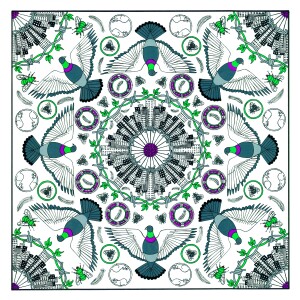 I may not be listening to Modern Nature’s How To Live right, but know what? I don’t care! And somehow I don’t think frontman Jack Cooper would care much, either.
I may not be listening to Modern Nature’s How To Live right, but know what? I don’t care! And somehow I don’t think frontman Jack Cooper would care much, either.
Modern Nature is a new project for Cooper, who also performs as Ultimate Painting and Mazes, and who also had a debut solo album Sandgrown in 2017 that I loved. On Modern Nature he’s joined by Will Young on electronica, whose projects include one called BEAK> and another called Moon Gangs that I’m not familiar with.
Sandgrown was a song cycle, or at least a “suite of songs” built around Cooper’s memories of growing up in the English coastal resort town of Blackpool. He so enjoyed doing an album of related songs that he approached Young with the idea and started building with him these songs that tell a story. Nowhere does he spell out what that story is, and these are not story songs at all, but the album’s publicity materials do say that it moves from urban to rural in setting. The enigmatic songs themselves and repeated ideas and sounds both instrumental and lyrical, give this album a rich sense of layering and depth.
What I mean when I say I’m listening to it wrong is that I haven’t even begun to pay attention to the carefully crafted lyrics (which tend to be lower in the mix below the instrumental tracks). I’m stuck on the sheer rich and varied soundscapes. For one, Young seems much more into playing drones than beep-beeps, and these days I’m all about the drone. Second, and speaking of drones, are the mesmerizing lines played on cello by Rupert Gillett. And third, I’m actually REALLY listening to it for the killer saxophone of Jeff Tobias, whose main gig is in the psych-punk-freejazz band Sunwatchers. Here he’s not playing freestyle but close to it, with jagged solos that push harmonic boundaries without ever fleeing the confines of song structure. There are a couple of great alto sax solos for example one of the three singles for this album, the second track “Footsteps.” And his accents during the third verse are pretty spot-on, too. The video probably ties in with the album’s narrative. It reflects the album’s urban-rural movement, although it has a dreamlike or even nightmarish nonlinear quality of flashback and flashforwards. Cooper’s insistent guitar lines and Aaron Neveu’s driving drums belie Cooper’s hushed vocal delivery.
Sadly, Tobias’s sax and Gillett’s cello are less prominent as the album goes along, but it’s still mesmerizing. The songs flow one into the other with no breaks, and they more or less alternate between quiet, pensive arrangements and more rhythmic, electric songs. Cooper also incorporates field recordings, from what sounds like a train station on the “Footsteps” outro to a lengthy recording of surf on a beach as the album fades out on the last track “Devotee.” That one is gorgeously arranged with a synth bass and cello droning behind the unison arpeggios of keyboard and acoustic guitar and Cooper’s hushed vocals, until it eventually breaks into an upbeat instrumental reprise, sort of, of the melody used in the quiet “Nightmares.”
How To Live has a lot going on, and a lot to recommend it. Unusual instrumentation, enigmatic lyrics, and a through line that ties it all together. It is indie music at its finest.
(Bella Union, 2019)
